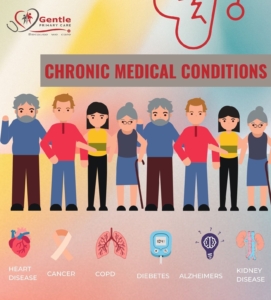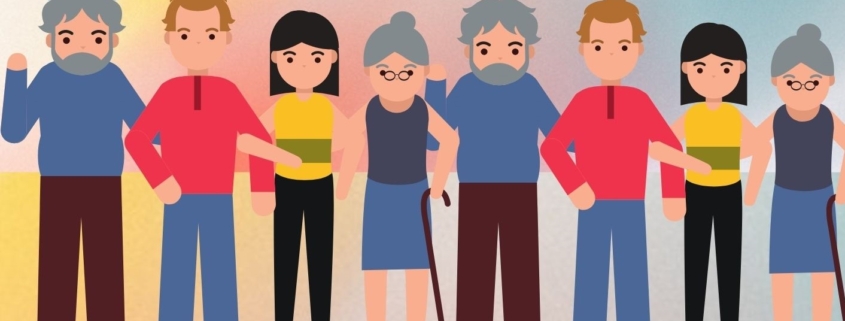Chronic Diseases Treatment
Chronic Diseases Treatment Sugarland
Chronic diseases are defined broadly as conditions that last 1 year or more and require ongoing medical attention or limit activities of daily living or both. Chronic diseases such as heart disease, cancer, and diabetes are the leading causes of death and disability in the United States. They are also leading drivers of the nation’s $4.1 trillion in annual health care costs.

Many chronic diseases are caused by a short list of risk behaviors Chronic Diseases Treatment Sugarland give us some points:
- Tobacco uses and exposure to secondhand smoke.
- Poor nutrition, including diets low in fruits and vegetables and high in sodium and saturated fats.
- Physical inactivity.
- Excessive alcohol use.
Although the burden associated with chronic illness is well documented, the burden associated with the treatment and management of chronic illness has not been well defined. According to Chronic Diseases Treatment Sugarland Related terms such as disease burden and symptom burden have been well articulated, but the definition of treatment burden has remained elusive and confusing.
Although treatment burden is often inseparable from disease burden, As per Chronic Diseases Treatment Sugarland it is not based on the natural history of the disease, but on the need to treat the disease in order to change its course or ameliorate its effects. Treatment burden is, therefore, an important concept that is distinct from disease burden, symptom burden and other related terms.
According to Chronic Diseases Treatment Sugarland Treatment of chronic illness comes in many forms including surgery, physical therapy, psychological therapy, and radiotherapy. However, one of the most common treatment forms is the use of medication. The prevention and treatment of chronic illness, especially when involving multiple medications, can become burdensome.
Contact:- Chronic Diseases Treatment Sugarland
Characteristics of a chronic illness: –
Chronic illnesses are mostly characterized by:
- complex causes
- many risk factors
- long latency periods (time between onset of the illness and feeling its effects)
- a long illness
- functional impairment or disability.
Chronic Diseases Treatment Sugarland describe us Most chronic illnesses do not fix themselves and are generally not cured completely. Some can be immediately life-threatening, such as heart disease and stroke. Others linger over time and need intensive management, such as diabetes. Most chronic illnesses persist throughout a person’s life, but are not always the cause of death, such as arthritis.
Common chronic illnesses: –
While many illnesses can be considered chronic, there are 12 major chronic conditions that are a significant burden in terms of morbidity, mortality and healthcare costs in Texas, including:
- heart disease
- stroke
- lung cancer
- colorectal cancer
- depression
- type 2 diabetes
- arthritis
- osteoporosis
- asthma
- chronic obstructive pulmonary disease (COPD)
- chronic kidney disease
- oral disease.
Contact:- Chronic Diseases Treatment Sugarland
Ways to cope with chronic illness: –
There is a range of ways to deal with the stress of chronic illness. These include:
- Finding information – this can help if you feel helpless or out of control.
- Emotional support from others – particularly family and friends, this can be a source of great help.
- Joining a well facilitated support group.
- Setting concrete, short-term goals – to restore certainty, power and control.
- Thinking about possible outcomes – discussing them with your doctor can help you to face them before they become a reality.
The overall aim of these strategies is to help put your illness into context and give some meaning to what is happening.
How is the Chronic Illness treatment done?
Treatment for the chronic illness depends on the underlying disorder. A doctor of Chronic Diseases Treatment Sugarland will diagnose the condition and will begin treatment accordingly. The course of treatment for chronic illnesses will differ from one to the other. For instance, the treatment for asthma will be different from the treatment for cardiovascular diseases.
For any heart related conditions, the doctors will likely prescribe medicine that facilitates the flow of blood from the heart to other parts of the body. Similarly, in case of asthma, doctors may only ask the patient to use an inhaler.
As per Chronic Diseases Treatment Sugarland In case of diabetic patients, regular insulin shots are usually used. The insulin helps regulate the blood sugar levels in the blood. Colorectal and lung cancer on the other hand is treated with the help of radiation therapy and chemotherapy.
Depression is often caused as a side effect to the chronic illness. This must also be treated with proper medication and psychiatric counselling.
Are there any side effects?
Side effects of the treatment depend on the condition. For instance, heart medications can cause rash, diarrhoea, itching, headache, chest pain, gangrene, and dizziness. Cancer treatment methods such as chemotherapy and radiation therapy on the other hand can lead to loss of hair, loss of appetite, weight-loss, nausea, vomiting and more.
However, it is true that side effects of a medication for a particular chronic illness may not have as many side effects as the drug used to treat another such illness.
How long does it take to recover?
Treatment takes a lot of time. In most cases, people must continue with the treatment for the rest of their life. However, the symptoms of the diseases can be kept under control with medication. Patients will likely experience better health a few days after starting to consume the drugs.
Are the results of the treatment permanent?
Results of the treatment are seldom permanent. In fact, most chronic illnesses are very difficult to cure. Medication is used to keep the conditions managed, rather than curing it completely. However, if the patient stops taking these drugs, their symptoms will likely recur.
What are the alternatives to the treatment?
The only alternatives to the treatment related to chronic illnesses include the maintenance of a healthy lifestyle. This means that the patient would need to maintain a diet, the ideal weight, perform daily exercises and give up smoking and drinking completely. While taking these steps will not cure the disorder, it will certainly help in reducing the symptoms related to the chronic illness.
For Chronic Diseases Treatment Sugarland
Contact- Gentle Primary Care near Sugarland which is located at 6909 Brisbane Court, Sugar Land Texas 77479.




Too good information that you shared. It would be so useful post for those are searching such kind of information.
This is a great article. I enjoyed reading it and will appreciate your contribution to my knowledge.
The post you shared makes the readers assume that it is a fantastic article. It has lots of information and certainly worth reading
Thank You for your sharing. This was Awesome. Keep sharing more.This encourages others also
Thank you for sharing such a brilliant article with us, hope you keep up the good work and please feel free to share other brilliant ideas with us.
Thanks for your efforts in sharing this post with us. This was really awesome. kindly keep continuing the great work
Your blog is very informative and well written. I like the way you described each step in a concise way with lots of examples. I think you did an excellent job on this article, keep it up!
Your writing is engaging, your topics are varied and interesting. Your ability to switch between themes keeps things fresh and your audience engaged. Keep up the great work!
Thank you for your great post. I’m glad that I found the blog which is useful for me. Good luck
Thank you very much for posting this valuable content. I appreciate your work, It would be helpful for everyone
Your writing is engaging, your topics are varied and interesting. Your ability to switch between themes keeps things fresh and your audience engaged. Keep up the great work!
This is a great article. I enjoyed reading it and will appreciate your contribution to my knowledge.
Thanks for all your help, we really appreciate it and hope to work with you again in the future.
Thank you for sharing this incredible content. Your work is truly commendable, and I want you to know how much I appreciate the effort you’ve put into creating it. This valuable information will undoubtedly make a positive difference for many people.
I wanted to take a moment to express my appreciation for the valuable content you create. Your expertise is evident, and I’m learning so much from you.